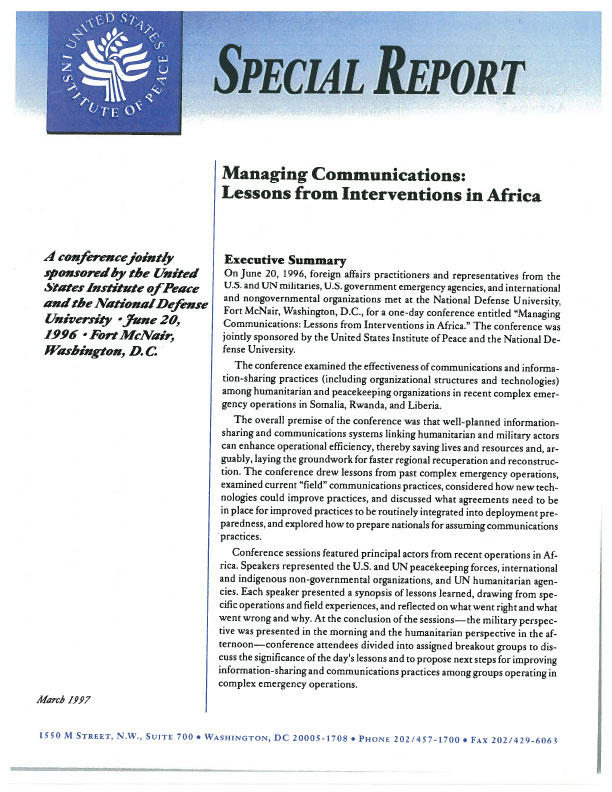"Managing Communications: Lessons from Interventions in Africa," the conference was jointly sponsored by the United States Institute of Peace and the National Defense University. It examined the effectiveness of communications and information-sharing practices (including organizational structures and technologies) among humanitarian and peacekeeping organizations in recent complex emergency operations in Somalia, Rwanda, and Liberia.

Executive Summary
On June 20, 1996, foreign affairs practitioners and representatives from the U.S. and UN militaries, U.S. government emergency agencies, and international and nongovernmental organizations met at the National Defense University, Fort McNair, Washington, D.C., for a one-day conference entitled "Managing Communications: Lessons from Interventions in Africa." The conference was jointly sponsored by the United States Institute of Peace and the National Defense University.
The conference examined the effectiveness of communications and information-sharing practices (including organizational structures and technologies) among humanitarian and peacekeeping organizations in recent complex emergency operations in Somalia, Rwanda, and Liberia.
The overall premise of the conference was that well-planned information sharing and communications systems linking humanitarian and military actors can enhance operational efficiency, thereby saving lives and resources and, arguably, laying the groundwork for faster regional recuperation and reconstruction. The conference drew lessons from past complex emergency operations, examined current "field" communications practices, considered how new technologies could improve practices, discussed what agreements need to be in place for improved practices to be routinely integrated into deployment preparedness, and explored how to prepare nationals for assuming communications practices.
Conference sessions featured principal actors from recent operations in Africa. Speakers represented the U.S. and UN peacekeeping forces, international and indigenous NGOs, and UN humanitarian agencies. Each speaker presented a synopsis of lessons learned, drawing from specific operations and field experiences, and reflected on what went right and what went wrong and why. At the conclusion of the sessions -- the military perspective was presented in the morning and the humanitarian perspective in the afternoon -- conference attendees divided into assigned breakout groups to discuss the significance of the day's lessons and to propose next steps for improving information sharing and communications practices among groups operating in complex emergency operations.